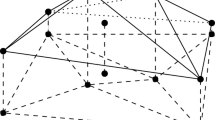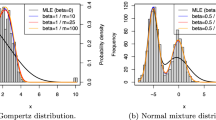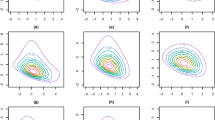Abstract
Let f be an unknown multivariate density belonging to a set of densities \(\mathcal{F}_{k^{*}}\) of finite associated Vapnik–Chervonenkis dimension, where the complexity k * is unknown, and ℱ k ⊂ℱ k+1 for all k. Given an i.i.d. sample of size n drawn from f, this article presents a density estimate \(\hat{f}_{K_{n}}\) yielding almost sure convergence of the estimated complexity K n to the true but unknown k * and with the property \(\mathbf{E}\{\int|\hat{f}_{K_{n}}-f|\}=\mbox{O}(1/\sqrt{n}\,)\) . The methodology is inspired by the combinatorial tools developed in Devroye and Lugosi (Combinatorial methods in density estimation. Springer, New York, 2001) and it includes a wide range of density models, such as mixture models and exponential families.
Similar content being viewed by others
References
Biau G, Devroye L (2004) A note on density model size testing. IEEE Trans Inf Theory 50:576–581
Biau G, Devroye L (2005) Density estimation by the penalized combinatorial method. J Multivar Anal 94:196–208
Biau G, Györfi L (2005) On the asymptotic properties of a nonparametric L 1-test of homogeneity. IEEE Trans Inf Theory 51:3965–3973
Cao R, Lugosi G (2005) Goodness-of-fit tests based on the kernel density estimator. Scand J Stat 32:599–616
Devroye L (1997) Universal smoothing factor selection in density estimation: theory and practice (with discussion). Test 6:223–320
Devroye L, Györfi L (1985) Nonparametric density estimation: the L 1 view. Wiley, New York
Devroye L, Györfi L, Lugosi G (1996) A probabilistic theory of pattern recognition. Springer, New York
Devroye L, Lugosi G (2001) Combinatorial methods in density estimation. Springer, New York
Dudley RM (1978) Central limit theorems for empirical measures. Ann Probab 6:899–929
Dudley RM (2002) Real analysis and probability. Cambridge University Press, Cambridge
James LF, Priebe CE, Marchette DJ (2001) Consistent estimation of mixture complexity. Ann Stat 29:1281–1296
McDiarmid C (1989) On the method of bounded differences. In: Surveys in combinatorics 1989, pp 148–188. Cambridge University Press, Cambridge
Nagaev SV (1965) Some limit theorems for large deviations. Teor Verojatn Primen 10:231–254 (Russian)
Priebe CE (1994) Adaptive mixtures. J Am Stat Assoc 89:796–806
Rogers GW, Marchette DJ, Priebe CE (1995) A procedure for model complexity selection in semiparametric model mixture density estimation. In: Proceedings of the 10th international conference on mathematics and computer modelling, 1995
Vapnik VN, Chervonenkis AYa (1971) On the uniform convergence of relative frequencies of events to their probabilities. Theory Probab Appl 16:264–280
Yatracos YG (1985) Rates of convergence of minimum distance estimators and Kolmogorov’s entropy. Ann Stat 13:768–774
Author information
Authors and Affiliations
Corresponding author
Rights and permissions
About this article
Cite this article
Biau, G., Cadre, B., Devroye, L. et al. Strongly consistent model selection for densities. TEST 17, 531–545 (2008). https://doi.org/10.1007/s11749-006-0042-6
Received:
Accepted:
Published:
Issue Date:
DOI: https://doi.org/10.1007/s11749-006-0042-6
Keywords
- Histogram-based estimate
- Mixture densities
- Multivariate density estimation
- Strong consistency
- Vapnik–Chervonenkis dimension




